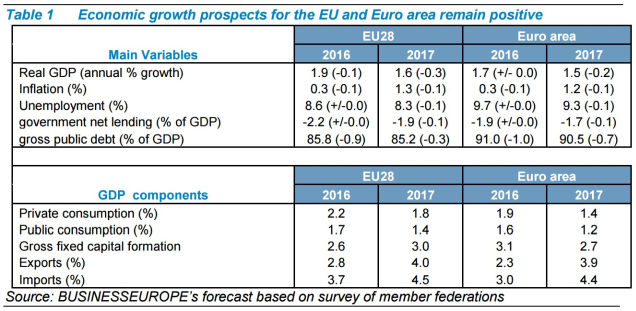Editor's note
International Internet Magazine. Baltic States news & analytics
Thursday, 02.05.2024, 18:21
60 years of European integration: perspectives for business
 Print version
Print version |
|---|
The
summit taken place on 25 March to commemorate the 60th anniversary
of the Treaty of Rome is aimed to show further integration’s paths for the now
EU 27 member states. The EU leaders would like to sketch the ways forward in
the years to come. The draft document prepared in view of the Rome Declaration
states that the EU-27 must show that the European Union is “capable of
addressing the challenges of a rapidly changing world” and that they are
“determined to make the EU stronger and more resilient”.
The
Treaty’s anniversary is the perfect opportunity to reflect on EU’s future. Due
to modern challenges facing Europe (Brexit, rising populism and nationalism,
migration, etc.), the whole EU’s integration process need a reforming approach.
The process has to include both the EU institutions and existing policies (as
well as decision-making), which shall be adapted to current disruptions in order
to foster new strategies.
Multiple
crises are threatening the EU's integration process
and a number of structural challenges require urgent action if further troubles
are to be avoided. They are destined to have a significant impact on the EU's
internal cohesion and its image in the world.
The
60th anniversary is both a symbolic event and time for reflection on
the EU’s future while re-assessing its historical evolution
and fundamental guidelines.
Questions to deal with…
However, the EU-27 is divided on many issues with distrust
and growing nationalism as widely spread issues. So, how likely is it that the
outcome will be able to re-inspire the European project and which concrete
steps might follow after the Rome Declaration? Besides, it’s still quite
unclear of which of the scenarios mentioned in the European Commission’s recent
White Paper are likely to materialize?
Important perspective issue is about a “political window of
opportunity” after the French and German elections concerning new initiatives
to deepen European cooperation, future of EMU, social Europe and/or the
security dimension?
Finally, the EU states have to make a common decision related
to a “multispeed Europe”.
However, the new narrative for EU will inevitably include
the following issues discussed at the EU business summit, EBS (22-23.03):
- EU’s trade strategy. EU is a key player
in international economic/trade relations, which need rethinking on its
long-term economic strategy while keeping in mind its leading role in the European
future. New foreign policy agendas in the US (e.g. America First, Global
Britain, etc.) provide for a new EU’s geopolitical strategy. Thus, revised EU’s
political economy will play an important role in European future with the European
business community seeking support to bolster the economy. With the US moving
closer towards protectionism and Asia taking centre-stage in the international
trade market, Europe needs to position itself in this new world order. The EBS questions
the ways the EU decision-makers strategically coordinate the EU’s economic
diplomacy to generate new market opportunities for businesses.
- EU’s healthcare
policy. With the rise of digitalisation, an aging population and associated
chronic diseases, the European health industry has been disrupted by several
changes. The challenges are well recognised, but the EU and the member states
shall do more in “collectively addressing” one of the major European
socio-economic issues.
- European start-ups.
The main issue is to unleash the start-ups potentials. Some important issues to
deal with are: venture capital investments, building a real European start-up
culture and exchanging experiences from young starters.
- Living space:
successful “smart cities”. Most important in this narrative direction is
how the European cities are transforming the future of living, Besides, the
decision-makers shall find out how to make European cities smarter and in line
with the digital revolution and other 4th industrial revolution
challenges.
- Sustainable
development issues. The narrative needs a more concise view as to how
progressive business practices could support inclusive growth, more jobs and
equality. Global Sustainable Development Goals, SDGs already enforced by the UN
2030 agenda since January 2016, set out 17 global targets in addressing the
most pressing current economic, social, health, environmental, etc. issues.
SDGs provide a unique opportunity for Europe to generate real sustainable
impact towards an innovative, prosperous and inclusive society. See more: http://www.ebsummit.eu/speakers.php
Recent views on EU’s
growth The EU’s growth rate is expected to be at the level of 1,9-1,6% for
the EU-27 and 1,7-1,5% for the eurozone area. Anyway, the Brexit issue would
not significantly damage the EU’s business confidence.
However, on the Businesseurope’s
account, there could be some long-term “political risks” to both the EU and UK
economies. Besides, as global trade is slowing, the EU could face some
difficulties in trade with outside world, following rise in the euro exchange
rate since the end of 2016.
https://www.businesseurope.eu/policies/economy-and-finance/macroeconomic-policy-economic-outlook.
Quite notable that the European Commission has put already
the EU-US TTIP agreement on hold: the previous team-work is suspended presently
and substituted with another working group called “trade and harnessing
globalisation” showing a different perspective.

Drafting a Declaration
Already a week before
the Rome summit, there were signs of “editing” the initial 5-option text, i.e.
the declaration is evolving. The draft discussed contained a watered-down version
of a “multi-speed Europe”; besides, the new version makes clearer that the EU
treaties won’t change. For example, Scenario 4 of the Commission’s white
paper on the Future of Europe (doing less, more efficiently) is also under
consideration for a summit declaration.
Some changes are expected: e.g. the “old text” says that
“the EU countries work together on the understanding that some of us can
move closer, further and faster in some areas.” The new draft text suggests:
“we will act together whenever possible, at different paces and intensity where
necessary, as we have done in the past within the treaty framework and leaving
the door open to those who want to join later. Our Union is undivided and
indivisible.”
The EU trade unions and “civil society” made (on 21.03) their
own suggestions for the Rome’s declaration. “In these uncertain times, the document said, European citizens seek a
stronger focus on those core ‘European values’, not a reduced one. They seek
economic, social and environmental well-being; as well as economic
well-being in the form of prosperity for all and the redistribution of wealth.
Social well-being has to provide for the provision of quality, affordable
services for all and a reinforcing of the social fabric which binds us
together. On the other hand, “environmental well-being is residing in a healthy
natural environment that sustains all life on Earth and protects our clean
water and air”.
Among the trade unions’ suggestions there are some issues
important for the Baltic States, e.g. “strengthening of education as a public
responsibility that offers lifelong learning for all in order to develop active
citizenship, critical thinking, social inclusion and an awareness of sustainable
development and human rights”; a just transition for workers and industrial
regions from the current economic model to a modern, vibrant, green and
socially just economy in which human and natural capital is cherished; a “European
Social Model” that provides full protection to all workers, all consumers and
all people living in the EU; one that reverses the wealth gap and reduces
poverty and social exclusion”.
Among those who signed the EU trade-unions’ petition are
some unions from Latvia: Free Trade Union Confederation of Latvia (LBAS),
Latvian Fund for Nature and Latvian Anglers Association. See: http://www.politico.eu/wp-content/uploads/2017/03/The-Europe-We-Want
60 years of European integration has to be assessed with
balancing gains and losses by both the old and new EU member states. Thus, the
EU complicated issues and problems are still in the political agenda in the EU with
serious consequences for the Baltic States.











